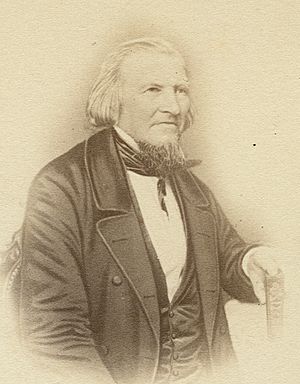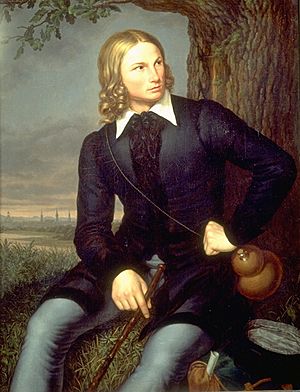August Heinrich Hoffmann von Fallersleben facts for kids
Quick facts for kids
August Heinrich Hoffmann von Fallersleben
|
|
|---|---|
 |
|
| Born |
August Heinrich Hoffmann
2 April 1798 Fallersleben, Holy Roman Empire
|
| Died | 19 January 1874 (aged 75) Höxter, German Empire
|
| Nationality | German |
| Occupation | Poet, librarian, professor |
|
Notable work
|
"Das Lied der Deutschen" |
August Heinrich Hoffmann (born April 2, 1798 – died January 19, 1874) was a well-known German poet. He added "von Fallersleben" to his name, which was the name of his hometown.
He is most famous for writing "Das Lied der Deutschen" (The Song of the Germans). The third part of this song is now the national anthem of Germany. He also wrote many popular songs for children. These songs are still loved and sung today.
Contents
A Poet's Life: Early Years and Education
August Heinrich Hoffmann was born in Fallersleben, a town in Lower Saxony, which was part of the Holy Roman Empire at the time. His father was a merchant and also the mayor of their town.
He went to good schools in Helmstedt and Braunschweig. Later, he studied at the universities of Göttingen and Bonn. He first planned to study theology (the study of religion). However, he soon decided to focus completely on literature, which is the study of books and writing.
Becoming a Professor and Librarian
In 1823, Hoffmann got a job as a librarian at the university in Wrocław (which was called Breslau back then). He worked there until 1838. He also became a professor of German language and literature at the same university. He was first an "extraordinary professor" in 1830, and then a full "ordinary professor" in 1835.
However, Hoffmann lost his job in 1842. This happened because of his book of poems called Unpolitische Lieder (meaning "Unpolitical Songs"). These songs were seen as critical of the government, and they upset the authorities in Prussia.
Life in Exile and Return
After losing his job, Hoffmann had to leave Prussia. He traveled around Germany, Switzerland, and Italy. He also lived for a few years in Mecklenburg, where he became a citizen.
After the revolutions of 1848, he was allowed to return to Prussia. He got his rights back and even received a salary for a job that was promised to him. In 1849, he got married. For the next ten years, he lived in different places like Bingerbrück, Neuwied, and Weimar. In Weimar, he helped edit a yearly book called Weimarische Jahrbuch.
In 1860, he became a librarian for a duke at a castle called Corvey, near Höxter. He lived there until he passed away in 1874.
Hoffmann's Famous Works and Songs
Hoffmann von Fallersleben was one of the most popular poets of his time. He believed in progress and change in politics. He was one of the first and most important poets who wrote political songs. These songs helped prepare the way for the revolutions of 1848.
His poems were special because they were easy to understand, simple, and graceful. They expressed the feelings and hopes of everyday life. Even though he didn't study music formally, he wrote tunes for many of his songs. Many of these songs are still sung by people all over Germany today.
The German National Anthem
One of his most famous works is the patriotic song "Das Lied der Deutschen." It starts with the words Deutschland, Deutschland über alles. The music for this song was composed by Joseph Haydn in 1797. Hoffmann wrote the words in 1841 on the island of Heligoland, which was controlled by the British at that time.
The words of the song showed a strong desire for a united Germany. This was a common feeling among people who wanted change during that period. The phrase über alles (above all) did not mean conquering other countries. Instead, it meant that loyalty to a united Germany should be more important than loyalty to smaller regions or states.
Beloved Children's Songs
Many of Hoffmann von Fallersleben's children's songs are still very popular. Almost every German child knows them. Some of these well-known songs include:
- "Alle Vögel sind schon da" (All the birds are already here)
- "Ein Männlein steht im Walde" (A little man stands in the forest)
- "Summ, summ, summ" (Buzz, buzz, buzz)
- "Winters Abschied" (Winter's Farewell, also known as "Winter ade, scheiden tut weh")
- "Kuckuck, Kuckuck, ruft's aus dem Wald" (Cuckoo, cuckoo, it calls from the forest)
- "Der Kuckuck und der Esel" (The Cuckoo and the Donkey)
- "A, a, a, der Winter der ist da" (A, a, a, winter is here)
- "Der Frühling hat sich eingestellt" (Spring has arrived)
- The Christmas song "Morgen kommt der Weihnachtsmann" (Tomorrow Santa Claus is coming)
Other composers, like Amalie Scholl and Pauline Volkstein, also created music for Hoffmann von Fallersleben's words.
Other Important Writings
Besides his famous songs, Hoffmann also wrote other important works. His book Gedichte ("Poems", 1827) is considered one of his best poetry collections. Other notable works include:
- Alemannische Lieder ("Alemannic Songs", 1826)
- Soldatenleben ("Soldier's Life", 1852)
- Rheinleben ("Rhine Life", 1865)
- Fünfzig neue Kinderlieder ("Fifty New Children's Songs")
- Alte und neue Kinder ("Old and New Children's Songs")
His "Unpolitical Songs" and other political writings are interesting because they show the important ideas and movements of his time. Hoffmann was also a dedicated scholar who studied old German literature. His research helped people understand the history of the German language and literature better.
He also edited and published older historical works, such as:
- Reineke Vos
- Monumenta Elnonensia
- Theophilus
His book Die deutsche Philologie im Grundriss ("Fundamentals of German Philology", 1836) was a valuable contribution to language research. Historians of German literature still find his works important, including:
- Geschichte des deutschen Kirchenliedes bis auf Luther ("History of the German Church Song up to Luther", 1832)
- Unsere volkstümlichen Lieder ("Our Folk Songs", 1869)
- Die deutschen Gesellschaftslieder des 16. und 17. Jahrh. ("German Society Songs of the 16th and 17th Centuries", 1860)
From 1868 to 1870, Hoffmann published his autobiography in six volumes, called Mein Leben: Aufzeichnungen und Erinnerungen ("My Life: Notes and Memories").
Images for kids
See also
 In Spanish: August Heinrich Hoffmann von Fallersleben para niños
In Spanish: August Heinrich Hoffmann von Fallersleben para niños
- Deutschlandlied
- Sequence of Saint Eulalia




